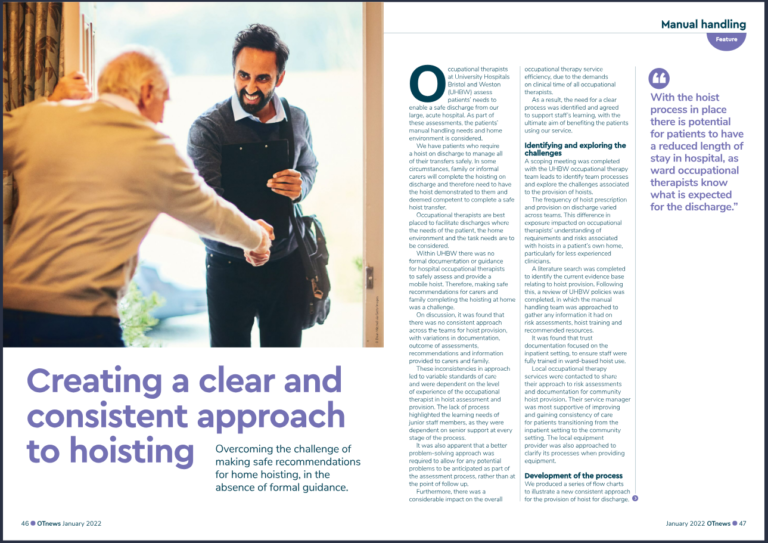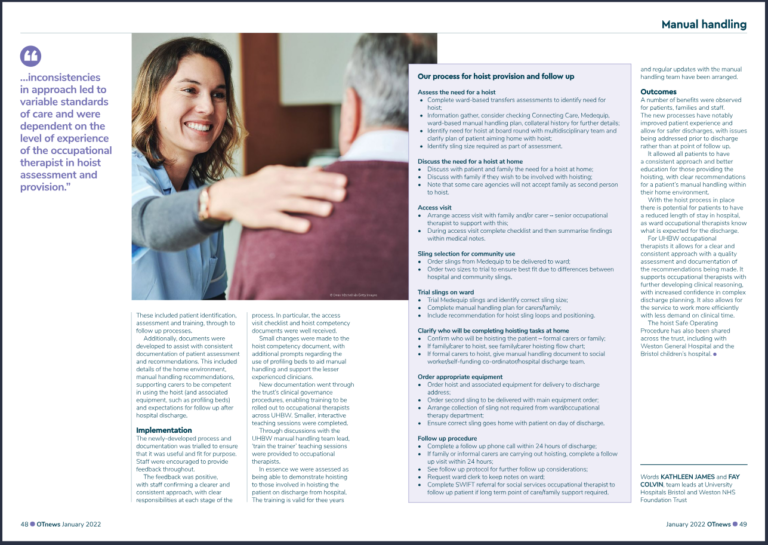“Introducing post-operative exercises has shown to improve post-op outcomes”
Occupational Therapists & Physiotherapists collaborated
on a piece of work to enhance post-operative recovery…
Workout Window
This project aims to set up a workout station on a thoracic and head and neck surgical ward, encourage independent use of this to aid post op recovery/reach ERAS goals and gain feedback from service users on their experience using the window.
What is the Window Workout?
The Window Workout is an exercise station to enhance post-op recovery. It’s a series of images and text displayed on a window in an open area.
How did we measure results?
We gained direct feedback from patients who chose to use the Window Workout.
A series of 3 questions were sent out via questionnaire.
- 18 patients completed window workout exercise
- 100% of patients felt safe completing the exercise
- 80% of patients agreed the exercises were an appropriate level for their needs
Outcome
Overall patient and staff feedback extremely positive.
The workout window has continued to be used as part of physiotherapy sessions.
Further workout windows are to be rolled out on our GI, HPB and colorectal wards with specific surgery evidence based exercises.
Project Team
“With the hoist process in place, there is a potential for patients to have a reduced length of stay in the hospital..”
The Occupational Therapy team at UHBW have created a
clear and consistent approach to hoisting…
Hoist Project
Occupational Therapists (OT) provide formal training in safe safe hoisting, but the differences in hoisting equipment between hospitals and in the community, continue to make it difficult to provide safe and consistent recommendations.
Currently, there is no standardised process or documentation, leading to inconsistent practices and inefficiencies across teams, affecting patient experiences.
What is the Hoist project?
The development of a comprehensive and consistent process to be used by Occupational Therapists (OT) for the assessment and provision of new hoists for patient discharge.
How did we measure results?
- Verbal feedback from Trust staff was logged and reviewed
- Social services reports
- Manual Handling Lead assessment and report
Outcome
The hoist safe operating procedure has also been share across the trust, including Weston General Hospital and the Bristol Children Hospital.
A number of benefits were observes for patients, families and staff.
- Noticeably improved patient experience
- Safe discharges, with issues being addressed prior to discharge rather than at a point of follow up
- All all patients & hoist users experienced consistent and better education
- Reduced length of hospital stay
- For UHBW OT’s, it allows for a clear and consistent approach whilst documenting quality assessments and recommendation
- Increased confidence in complex discharge planning
Project Team
Fay Colvin – Clinical Specialist Occupational Therapist
Kathleen James – Clinical Specialist Occupational Therapist
Rachel Webber – Pathway lead Occupational Therapist
“A collaborative system-wide project with the Integrated Care Bureau, UHBW Adult Therapy Service, Sirona TEC and Bristol city council TEC”
UHBW Adult Therapies team up with other local service providers
to offer a cohesive solution
and improve care needs at home…
Technology Enhanced Care (TEC)
A joint pilot with the Integrated Care Bureau, UHBW Adult Therapy Service, Sirona TEC and Bristol city council TEC
What is TEC?
These are Technology Enhanced Care in forms of pendant alarms, falls sensors, memory aids, light sensors.
How did we measure results?
- Review the data to measure the impact on hospital discharges
- Length of stay
- Change in discharge pathways
- The number of care visits
Outcome
- 122 patients on the pilot so far
- Type of equipment provided: pendant alarms, falls detectors, memory clocks, light sensors
- Improved knowledge and understanding of the benefits of TEC amongst acute therapy staff
- Acute staff supporting patients to return home with additional support and reassurance
- Quick and easy referral process
- Collaborative working between the ICB, UHBW, Sirona and BCC
Project Team
Kathleen James – Clinical Specialist Occupational Therapist
Rachel Webber – Clinical Lead Occupational Therapist
“There are approximately 1000 patients under UHBW on Cough Augmentation.”
Our UHBW Physiotherapy team get creative and roll out
a more accessible digital carer training…
Home ventilation service
There are approximately 1000 patients under the service on NIV/Cough Augmentation. Not everyone is able to use their device independently.
We wanted to standardise training, reduce clinical time delivering training, prevent discharge delays and reduce barriers to access training.
What is Home Ventilation?
Home ventilator’s are machines that may be provided to patients for home use should they have a condition that makes it difficult to breathe on their own.
How did we measure results?
- Monitored online views
- Verbal feedback from patients and colleagues
Outcome
We have delivered easy to follow, accessible online training videos which take patients through step by step.
- Delivering virtual training in just 30 minutes
- Reaching care staff who are unable to attend face to face sessions
- More people are trained and competent, increasing patient safety
- Training is now standardised which improves the knowledge and skills of carers.
Project Team
Becky Hall – Advanced Physiotherapy Practitioner
Apply today
Do you want to join the Adult Therapies team at University Hospitals Bristol & Weston?
Take a look at the current vacancies across the Trust!







